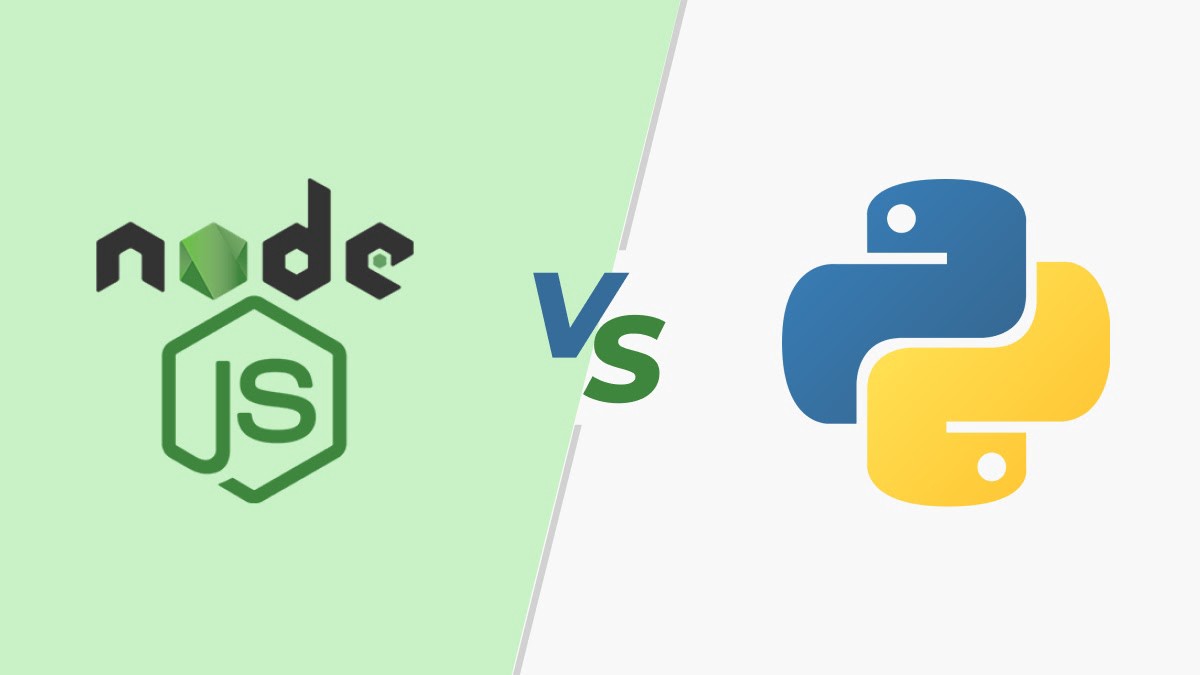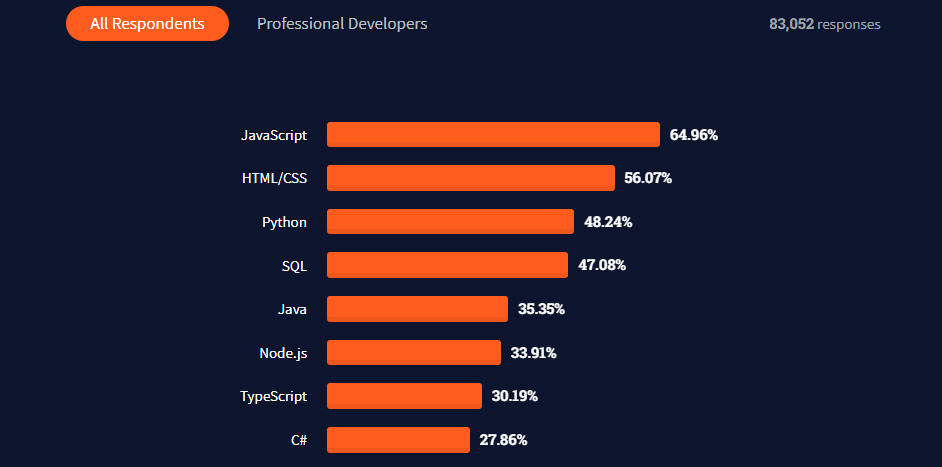Node.js vs Python: Which backend technology to choose in 2022?

Choosing a backend technology for your next project? Here’s a comparison of Node.js vs Python, two modern backend technologies. You can check out their pros and cons and select the one that suits your needs!
Choosing the right backend technology is vital for the success of your project and might even determine its success, or we say it, failure. So it is evident that you make the right choice. Node.js and Python are two widely used backend technologies around the globe. According to a survey conducted by Stack Overflow in 2021, these are the most used programming languages worldwide:

The survey determined that Python was the 3rd most popular programming language in 2021 worldwide. On the other hand, the survey also showed that Node.js was the 6th most widely used programming language globally. That’s not all; both these programming languages have a vast and growing user base expected to grow in the foreseeable future.
Depending on your resources, infrastructure, and capabilities, you might already have some criteria in mind. However, if you’ve already narrowed down your list to a few popular technologies like Node.js and Python, reading this article will make it even easier to choose!
What is Node.js?

Node.js is an open-source backend runtime environment based on JavaScript. It has been built on Google Chrome’s JavaScript V8 Engine. Ryan Dahl developed Node.js in 2009. Its newest version is v0.10.36. It is one of the most popular development frameworks worldwide.
Node.js is a fast, event-driven platform ideal for developing data-intensive and scalable networking applications. It is accessible and can run on many platforms such as Mac OS X, Windows, Linux, Unix, and more.
Node.js has a lot of advantages, making it an ideal backend technology for almost every type of project. It, however, is not devoid of flaws as well. Below are some of the pros and cons of Node.js, which might come in handy before choosing between Node.js and Python.
Pros of using Node.js
Following are some of the pros of using Node.js:
- Excellent performance
- Full-stack development
- Perfect for microservice development
- Code can be reused and shared
- Many free tools and extensions are available
Cons of using Node.js
Following are some of the cons of using Node.js:
- Slow at processing large data volumes
- Complex syntax
- Frequent updates and changes make
What is Python?

Python was introduced in 1991 by Guido van Rossum, and its implementation began in 1989. Python is an object-oriented dynamic language known for its simple, organized syntax. It is one of the most popular web development languages worldwide. It is a general-purpose programming language that can develop various applications and websites or conduct data analysis.
Python is a high-level programming language that has its pros and cons, which are discussed below.
Pros of using Python
Following are some of the pros of using Python:
- Quick development
- Fast and easy deployment
- Easy syntax
- Extensive ecosystem
- Strong community
- Powerful programming language
- Easy to learn and read
Cons of using Python
Following are some of the cons of using Python:
- A bit slower than other backend technologies
- Low-performance quality on a mobile
- Very simplistic
- Threading problems
Node.js vs. Python – A Comparison
We will now evaluate Node.js vs. Python for comparison purposes on various criteria such as performance and speed, universality, architecture, scalability, extensibility, libraries, error handling, community, usability, notable companies, and supported platforms.
1. Performance and Speed
Node.js is capable of fast processing, coupled with the fact that it has massive storage. It can simultaneously process multiple requests at once in a short period. Python, on the other hand, is comparatively slower in processing requests. Hence in terms of performance and speed, Node.js has the upper hand.
2. Universality
When we talk about universality in Node.js vs Python, while the former offers inherent cross-platform functionality, the same cannot be said for the latter. Python depends on the need for an interpreter for cross-platform usage.
Both are pretty universal multi-purpose technologies that can be used to develop various products.
However, it is to be noted that Python has one loop-hole which is that it usually isn’t used to develop mobile applications. Android and iOS, two of the largest mobile operating systems, do not provide Python as an official programming language. Therefore for mobile apps, you would almost always choose Node.js as a backend technology over Python.
3. Architecture
Node.js is based on an event-driven, non-blocking architecture and is therefore capable of top-notch, fast performance. It has an asynchronous architecture that can handle multiple processes at a time without any bottlenecks.
Python comparatively is not event-driven. Its model supports asynchronous architecture. You have to finish one process first before beginning another in python. Our final verdict in architecture would hence give the benefit of the doubt to Node.js
4. Scalability
Node.js has excellent scalability as well as it supports multi-threading facilities. However, python does not allow multi-threading due to its global interpreter lock; its scalability is limited. Plus there is also an issue with code maintenance in python in the case of scaling. So we can safely conclude that in scalability, Node.js has the upper hand.
5. Extensibility
Both backend technologies are equally efficient when it comes to extensibility. While Node.js works with the latest new frameworks such as Log.io, Babel, and Jasmine, Python has excellent extensibility as well with various frameworks including Jango, Flask, Sublime Text, etc. Again, Node.js and Python are at par, so there isn’t any clear winner. Both have a great many options for frameworks and services to choose from.
6. Libraries
While Python supports a PIP package manager, Node.js on the other hand supports an NPM package manager. NPM has over 350,000 and is one of the biggest packages repositories in the world. When it comes to libraries, both backends have plenty of available alternatives you can go for. Therefore it isn’t easy to pick one over the two in this domain.
7. Error Handling
Both Node.js and Python have superb potential if we talk about error handling. Node offers excellent performance with multi-threading support, while Python makes debugging and troubleshooting easy with its range of options that can help developers squash those pesky bugs quickly. So we can conclude that in error handing, Node.js and Python are evenly matched.
8. Community
The debate between Node.js vs Python cannot be concluded without talking about community support. Though this isn’t as big of a factor as performance and speed it’s still essential.
So in this domain, Python is the clear winner with a much larger community because it’s the older of the two technologies. The Python community dates back to almost 1991 so evidently, it’s a technology for which you can quickly get assistance online if you’re ever stuck somewhere in the middle of a project. Node.js does not have that big of a community as compared to Python.
9. Usability
What are the different use cases of Node.js vs Python? Well, you could use python for several purposes like testing, automation, engineering, etc. Node.js can be used for the development and deployment of projects related to gaming, e-commerce, graphics, etc. So over here both are good in their own regards.
10. Notable companies
Which notable companies use either of the two technologies? This is an interesting question, and you’d be surprised to know that many famous platforms are running Node.js as well as Python. Big names that use Node.js include LinkedIn, Netflix, and PayPal. Instagram, Spotify, Reddit, Google, and Facebook use Python.
11. Supported Platforms
Node.js supports an abundance of platforms and has great cross-platform compatibility and support. Therefore, it will run seamlessly on popular platforms like Android, Mac, Windows, Linux, etc. You can develop many different applications with it, like cloud-based applications, hybrid applications, IoT solutions, and more. Python offers far less flexibility and is majorly used for desktop and web application development by full-stack developers.
Conclusion
To conclude and sum everything up, choosing a backend technology in 2022 can be challenging since many things are to consider. You want to save time, money, and resources, but you also don’t want to compromise on quality, scalability, and performance.
The debate between Node.js vs Python is never-ending. They both have pros and cons, clear advantages, and known drawbacks. When it comes down to choosing between the two, you need to decide based on what suits your needs.
Therefore, you should think about what type of product or service you want to develop, its end goals, and the resources you have on hand. Then pick a backend technology that fits. To make this process easier, you can consult a software development company in New Orleans.

